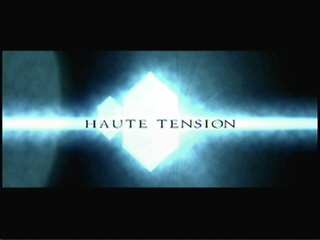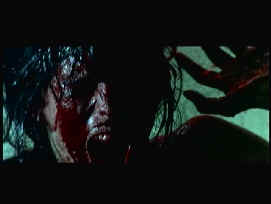Director: Alexandre Aja
France - 2003

----
Two young women, Marie (Cécile de France, from the unfortunate Steve Coogan/Jackie Chan remake of Around the World in Eighty Days) and Alex (Maïwenn Le Besco, whom the eagle-eyed might recognize as the cerulean Diva Plavalaguna from The Fifth Element), head to the country home of Alex's family to study for college exams. They plan on home-cooked meals, getting a lot of reading done, and preparing for the next step in their lives away from university, never suspectingthat what waits for them is a rendezvous with a straight razor-wielding, truck-driving, severed head-loving killer (Philippe Nahon, from Irréversible and I Stand Alone/Seul Contre Tous) eager to engage in some radical dissection, starting with Alex's family and not stopping until there is nothing left to stand between him and the object of his malevolent desires. It sounds like any number of slasher epics from the past few decades, setting up the archetypes we know and love (young women, spooky settings, insane killer, promising body count), yet none of that begins to encompass the Freudian minefield that is this twisted French confection of blood and beauty. I can say this- I yearn to hear what Carol Clover (author of Men, Women and Chainsaws, the definitive look at gender in the horror film) would think of this film’s approach to her theory of the Final Girl.
With its enveloping cinemascope photography and relentless sound design, Haute Tension is an immersive nightmare that simply does not stop for its taut eighty-seven minute running time. Country pastorals, forest roads, and convenience stores become epic battlegrounds in director/co-writer Alexandre Aja's hands, and scars are the only maps of this terrain. The visual sensibility of this film is without peer, utilizing languid cameramovement and long takes in conjunction with a sound mix that is as relentless as film has produced since Goblin's suitably legendary work on Argento's Suspiria or John Carpenter's immortal Halloween theme.
Two sequences, both dealing with the family guest room where Marie is staying, illustrate this masterful proficiency within the first reel and a half of the film. The first is a breathless single take that follows Marie up from the second floor of the house and into the guest room, laying out the complete geographic setup of the entire space in a continuous shot. Cinematographer Maxime Alexander deserves an inordinate amount of props for making the sequence seem effortless, not drawing attention to itself, merely conveying the maximum amount of visual information in the minimum amount of time expended.
The second involves Marie trying to hide any traces of her ever having been in the home when she knows that the killer will be searching the room; composer François Eudes and sound designer Pierre André raise the bar for using bass to keep an audience off-balance. Likewise is the exquisite song selection, utilizing both an 80s Italo classic ("Sara Perchè Ti Amo" by Ricchi e Poveri) and cutting-edge art-rock (Muse's "New Born") as touchstones for the fragmentary landscapes the film unfolds in.
The lead actresses are both excellent, especially considering how much of the film is carried by only the two of them. de France is a marvel, a natural magnet for the eyes and sympathies of the audience, keeping her performance keyed into the shifts in narrative and physical space of the film, working at an almost-Jennifer Jason Leigh pitch, but always in the service of the narrative. Maïwenn is given an even more difficult role, spending a significant portion of the film chained up and gagged. It is a testament to her presence that, when viewing the film for a second time, things become a little bit more clear based solely on paying attention to her eyes. And as the film’s nameless killer, Nahon is something different in the annals of slasheriana, a brute force that rarely speaks and is relentlessly thorough even as his ability to be resourceful when it comes to finding new implements of murder is unquestioned.
Gorehounds will be delighted to see that Aja has enlisted the hoo banging mack daddy of eurogore, Giannetto de Rossi, the guy who did gore for all of hackmeister Lucio Fulci's splatter epics like The Beyond, Zombie, and House by the Cemetary. His delicate and gruesome touch enlivens several distinctive murders with enough delirious carnageto delight even the most jaded of moviegoers. It says something that Haute Tension, when it gets its U.S. release in February 2005 (under the title “High Tension,” which is certainly a better title than its original moniker “Switchblade Romance.”), will be only the second film released with an NC-17 rating for violence. Bureaus, though, are something I had never once conceived of as a means of smiting one's victims. Fortunately, one of the great things about seeing lots of films is that you learn something new every day.
On the strength of this film, Aja has been given the reins of the upcoming remake of The Hills Have Eyes, which is a pairing both inspired and problematic; inspired because Aja’s gift for mayhem and unwillingness to hold back, problematic because his style as a director seems to smooth for the rough edges and hammer-blunt horror of that project. Regardless, the end result will doubtless give the MPAA screaming fits, which is almost enough reason for existing in the first place.
As sexually unnerving and rigorously constructed as it is remarkably gory, Haute Tension is the kind of horror film that seeps into the dark recesses of the subconscious. There's psychological subterfuge afoot, to be sure, and lots of playing with mirrors and slashing diagonal compositions and lesbian text and subtext, but the big twist at the heart of the film works with a strange sort of logic. Do not be fooled, though, there is an emotional resonance to this feral European beast, a queasy and empathetic sadness on a visceral par with David Lynch's Mulholland Drive… just with chainsaws.
-- Copyright © 2004 by Jason Shawhan

